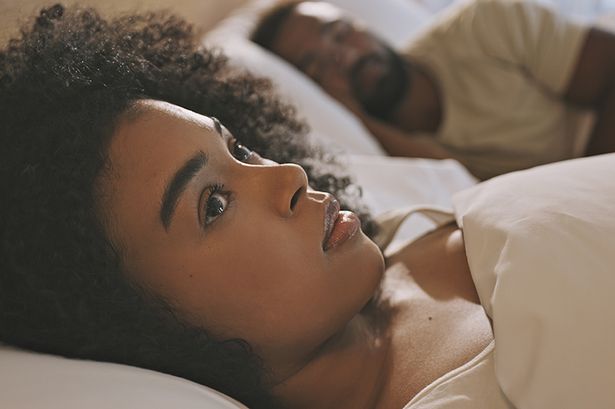Health
Doctor Reveals Why You Jolt Awake When Falling Asleep

Many individuals experience a sudden jolt that wakes them just as they start to drift off to sleep. This phenomenon, often accompanied by a sensation of falling, can be alarming and even distressing. Dr. Amir Khan, a familiar face on ITV’s Lorraine, recently addressed this common occurrence, explaining that it is typically harmless and normal.
The involuntary movement, known as a hypnic jerk, can leave individuals feeling anxious, as they may fear they are falling or at risk of injury. According to the NHS, hypnic jerks, also referred to as sleep starts, are prevalent sensations that occur as one transitions from wakefulness to sleep. They can manifest as a sudden twitch of the body or legs and may be exacerbated by factors such as sleep deprivation, stress, or consumption of caffeinated beverages.
Understanding Hypnic Jerks
Dr. Khan elaborated on the mechanics behind these jolts, stating that as a person falls asleep, their muscles relax. The brain may mistakenly interpret this relaxation as falling, triggering a quick reflex to prevent a potential fall. He explained, “As you drift into sleep, your muscles relax, and sometimes your brain interprets that as falling. But it’s a misinterpretation. So it sends a quick signal to your body to catch you, and that’s why you twitch awake.”
Some scientists propose that this reaction may stem from an ancient survival instinct, harking back to when humans slept in trees. A sudden jerk might have helped prevent actual falls from precarious perches.
Dr. Khan reassured viewers that hypnic jerks are entirely harmless, reinforcing the NHS’s guidance that these occurrences are more frequent in individuals who are stressed, consume caffeine late in the day, or are extremely fatigued. He encouraged those who experience these jolts to remain calm, stating, “Next time it happens, don’t panic; it’s just your brain being quirky. Totally normal, totally harmless.”
Public Reactions and Concerns
In response to Dr. Khan’s explanation, many viewers took to social media to share their experiences with hypnic jerks. Some expressed that their jolts can be quite intense, with one user humorously noting, “That was a very gentle jolt compared to mine! I think I actually leave four inches off the bed and I’m shaken after and can’t sleep.” Others remarked on the phenomenon’s peculiar nature, with one commenter observing, “Funny how your brain usually makes a little dream, such as tripping over or bumping into something, to match you jolting awake. So clever and weirdly quick!”
For those who have been anxious about their sleep disturbances, Dr. Khan’s insights provided a reassuring perspective. One viewer voiced gratitude, stating, “Omg, thank you for sharing this video, this happens to me and I was too embarrassed to ask anyone.”
Individuals who remain concerned about their sleep patterns or experience frequent hypnic jerks are advised to consult with a general practitioner for further guidance.
-

 Health3 months ago
Health3 months agoNeurologist Warns Excessive Use of Supplements Can Harm Brain
-

 Health4 months ago
Health4 months agoFiona Phillips’ Husband Shares Heartfelt Update on Her Alzheimer’s Journey
-

 Science2 months ago
Science2 months agoBrian Cox Addresses Claims of Alien Probe in 3I/ATLAS Discovery
-

 Science2 months ago
Science2 months agoNASA Investigates Unusual Comet 3I/ATLAS; New Findings Emerge
-

 Science2 months ago
Science2 months agoScientists Examine 3I/ATLAS: Alien Artifact or Cosmic Oddity?
-

 Entertainment2 months ago
Entertainment2 months agoLewis Cope Addresses Accusations of Dance Training Advantage
-

 Entertainment5 months ago
Entertainment5 months agoKerry Katona Discusses Future Baby Plans and Brian McFadden’s Wedding
-

 Science2 months ago
Science2 months agoNASA Investigates Speedy Object 3I/ATLAS, Sparking Speculation
-

 Entertainment5 months ago
Entertainment5 months agoEmmerdale Faces Tension as Dylan and April’s Lives Hang in the Balance
-

 Entertainment2 days ago
Entertainment2 days agoAndrew Pierce Confirms Departure from ITV’s Good Morning Britain
-

 World3 months ago
World3 months agoCole Palmer’s Cryptic Message to Kobbie Mainoo Following Loan Talks
-

 World4 weeks ago
World4 weeks agoBailey and Rebecca Announce Heartbreaking Split After MAFS Reunion









